- Home
- Gayle Forman
Just One Year jod-2 Page 10
Just One Year jod-2 Read online
Page 10
It’s not pointing at the map. But it’ll do.
• • •
The next morning I go downstairs in search of coffee. The worn dining room is practically empty—one Spanish-speaking family at one table, and in the corner by the window, a pretty woman about my age with hair the color of rust.
“I was wondering about you,” she calls in English. She sounds American.
I pour some coffee from the samovar. “I often wonder about me, too,” I reply.
“I saw you last night at the food carts. I’ve been trying to brave up to eat at them, but I wasn’t sure what they were serving or if it would kill a gringo like me.”
“I think it was pork. I don’t ask too many questions.”
“Well, it didn’t kill you.” She laughs. “And whatever doesn’t kill you makes you stronger.”
We stand there for a second. I gesture to join her at the same time she gestures for me to take a seat. I sit down across from her. A waiter in a tired tuxedo drops off a plate of Mexican sweet bread.
“Careful there,” she says, flicking at her own stale bread with a turquoise-painted nail. “I almost chipped a tooth.”
I knock at it. It sounds like a hollow log. “I’ve had worse.”
“What are you, some kind of a professional adventure eater?”
“Something like that.”
“Where are you from?” She holds up a hand. “No, wait, let me guess. Say something else.”
“Something else?”
She taps a finger to her temple, then snaps her fingers. “You’re Dutch.”
“Good ear.”
“Not much of an accent, though.”
“Very good ear. I grew up speaking English.”
“Did you live in England?”
“No, it was just my mother didn’t like speaking Dutch, thought it sounded too much like German. So at home, it was English.”
She glances at the phone on the table. “Well, I suspect there is a fascinating story behind that, but I’m afraid it’ll have to remain a mystery.” She pauses. “I’m a day late already.”
“Late for what?”
“For Mérida. I was supposed to be there yesterday, but my car broke down, and, well, it’s been a cascading comedy of errors. What about you? Where are you headed?”
I pause. “Mérida—if you’ll give me a ride.”
“I wonder what would piss off David more—driving alone or giving a ride to strangers.”
“Willem.” I hold out my hand. “Now I’m not a stranger.”
She narrows her eyes at my outstretched hand. “You’ll need to do better than that.”
“Sorry. I’m Willem de Ruiter.” I reach into my backpack for my stiff new passport and hand it over. “Here’s some identification.”
She flips through it. “Nice picture, Willem. I’m Kate. Kate Roebling. And I’m not showing you my passport because the picture is very unfortunate. You’ll just have to trust me on that.”
She smiles and slides my passport back across the table. “Okay, then, Willem de Ruiter, traveling adventure-eater. The garage just opened so I’m grabbing the car. Assuming it’s actually ready, I’ll be hitting the road in about a half hour. Does that give you time to get packed and ready to go?”
I point to my rucksack on the floor next to me. “I’m always packed and ready to go.”
• • •
Kate picks me up in a sputtering Volkswagen jeep, the seats torn, the foam stuffing coming out. “This is fixed?” I ask, climbing in.
“That’s just cosmetic. You should’ve seen it before. The muffler was falling out, literally dragging behind the car, sparking. The whole rainforest could’ve gone up in flames because of this baby. No offense. Who’s a pretty girl?” She pats the dashboard and turns to me, whispering. “You have to be nice to her. Or she won’t go.”
I tip an imaginary hat to the car. “My apologies.”
“This is actually a great car. Appearances can be quite deceiving, you know.” She guns the engine.
“Yes, I’ve noticed.”
“Thank God, or I’d be out of a job.”
“Bank robber?”
“Ha! I’m an actor.”
“Really?”
She turns to me. “Why? Are you of the tribe?”
“Not really.”
She raises an eyebrow. “‘Not really’? That’s like being ‘a little’ pregnant. You either are or you’re not.”
“How about I was, not seriously, and now I’m not.”
“Oh, did you need to get a ‘real job’?” she asks sympathetically.
“No. I don’t have one of those, either.”
“So you just travel and eat dangerously?”
“More or less.”
“Nice life.”
“More or less.” The car hits a pothole and my stomach seems to smack against the roof and then just as abruptly, plummet back to the floor. “What kind of acting do you do?” I ask when I’ve regained my equilibrium.
“I’m a cofounder and artistic director of a small theater company in New York called Ruckus. We do productions, but also training and teaching programs.”
“That’s not impressive at all.”
“I know, right? I never meant to be quite so ambitious, but when my friends and I moved to New York, we couldn’t get the kind of roles we wanted, so we started our own company. And it’s just kind of grown. We produce our own plays and we teach, and now we’ve started this overseas initiative. That’s why we’re in Mexico. We’re running a workshop on Shakespeare in Mérida in conjunction with Universidad Autónoma de Yucatán.”
“You’re teaching Shakespeare in Spanish?”
“Well, I’m not, because I don’t speak a lick of Spanish. I’ll work with the English speakers. David, my fiancé, he speaks Spanish. Though the funny thing is, even when we do the Shakespeare in translation, I somehow know where we are in the plays. Maybe because I know them so well. Or because Shakespeare transcends language.”
I nod. “The first time I did Shakespeare, I did it in French.”
She turns to me. Her eyes are green, bright as autumn apples, and there’s a smattering of freckles across the bridge of her nose. “You did Shakespeare then? And in French?”
“Mostly in English, of course.”
“Oh, of course.” She pauses. “That’s pretty good for a not-serious actor.”
“I never said I was any good.”
She laughs. “Oh, I can tell you were good.”
“Really?”
“Yep. I have a Spidey-sense for these things.” She pulls out a package of gum, takes a stick, and offers me a piece. It tastes like talcum powder and coconuts and makes my still-churning stomach rebel a little bit more. I spit it out.
“Vile, right? Yet strangely addictive.” She pops a second piece. “So how in the world did a Dutchman wind up doing Shakespeare in French?”
“I was traveling. I was broke. I was in Lyon. I met this Shakespeare troupe called Guerrilla Will. They mostly performed in English but the director is a little . . . eccentric and she thought the way to one-up the other street performers was to do Shakespeare in the native language. She’d cobbled together a cast of French speakers to do Much Ado About Nothing in France, in French. But the guy who’d been playing Claudio ran off to be with some Norwegian guy he’d met; everyone was already doubling up parts so they just needed someone who could get by in French. And I could.”
“You’d never done Shakespeare before?”
“I’d never acted before. I’d been traveling with an acrobatic troupe. So when I tell you it was all by accident, I’m not kidding.”
“But you did other plays?”
“Yeah, Much Ado was a disaster but we ran it for four nights before Tor realized it. Then Guerrilla Will switched back to English and I stayed on. It was decent money.”
“Oh, you’re one of those. Doing Shakespeare just for the money,” she jokes. “You whore.”
I laugh.
�
��So what other plays did you do?”
“Romeo and Juliet, of course. A Midsummer’s Night Dream. All’s Well That Ends Well. Twelfth Night. All the crowd-pleasers.”
“I love Twelfth Night; we’re talking about doing that next year when we have time. We just closed a two-year off-Broadway run of Cymbeline and we’ve been touring it. Do you know it?”
“I’ve heard of it, but I’ve never seen it.”
“It’s a lovely, funny, romantic play and there’s lots of music in it. At least the way we do it.”
“Us, too. We had a drum circle in our Twelfth Night.”
She glimpses at me sidelong as she keeps her eyes on the road. “Our Twelfth Night?”
“Theirs. Guerrilla Will’s.”
“Sounds like the whore fell in love with the john.”
“No. No falling in love,” I say.
“But you miss it?”
I shake my head. “I’ve moved on.”
“I see.” We’re quiet for a while. Then she says, “Do you do that a lot? Move on?”
“Maybe. But only because I travel a lot.”
She taps out a beat on the steering wheel, audible only to herself. “Or maybe you travel a lot because it lets you move on.”
“Perhaps.”
She’s quiet again. Then: “So are you moving on now? Is that what brought you to the grand metropolis of Valladolid?”
“No. The wind just blew me there.”
“What? Like a plastic bag?”
“I prefer to think of myself as a ship. Like a sailboat.”
“But sailboats aren’t steered by the wind; they’re powered by it. There’s a difference.”
I look out the window. The jungle is everywhere. I look back at her. “Can you move on from something when you’re not sure what it is you’re moving on from?”
“You can move on from absolutely anything,” she replies. “But that does sound a little complicated.”
“It is,” I say. “Complicated.”
Kate doesn’t answer, and the silence stretches out, shimmery, like the road ahead of us.
“And a long story,” I add.
“It’s a long drive,” she replies.
There’s something about Kate that reminds me of Lulu. Maybe it’s just that they’re both American or how we met: during journeys, talking food.
Or maybe it’s because in a few hours, I’ll never see her again. There’s nothing to lose. So as we drive, I tell Kate the story of that day, but it’s a different version from the one I told Broodje and the boys. You play to your audience, Tor always said. Which is maybe why I can tell Kate the parts of the story that I didn’t—couldn’t—tell Broodje and the boys. “It was like she knew me,” I tell her. “Straightaway, she knew me.”
“How?”
I tell Kate about Lulu thinking I’d deserted her on the train when I’d spent too long in the café. Hysterically laughing, and then out of the blue—my glimmer of her strange honesty—telling me she’d thought I’d got off the train.
“Were you going to?” Kate asks, her eyes wide.
“No, of course not,” I answer. And I wasn’t, but the memory of it still shames me because of what I was going to do later.
“So how did she see you, exactly?”
“She said she couldn’t understand why I invited her without an ulterior motive.”
Kate laughs. “I hardly think you wanting to sleep with a pretty girl qualifies as an ulterior motive.”
I wanted to sleep with her, of course. “But that wasn’t the ulterior motive. I invited her to Paris because I didn’t want to go back to Holland that day.”
“Why not?”
My stomach lurches again. Bram, gone. Yael, all but gone. The houseboat, a signature away from gone. I force a smile. “That is a much longer story and I’m not done with this one.”
I tell Kate the double happiness story Lulu told me. About the Chinese boy traveling to take some important exam, and along the way, falling sick. About the mountain doctor taking care of him. About the doctor’s daughter telling him this strange line of verse. About the emperor who, after the boy does well on the exam, recites a mysterious line to him. About the boy immediately recognizing the line as the other half of what the girl told him, and repeating the line the girl had told him, pleasing the emperor, getting the job, going back, and marrying the girl. About double happiness.
“Green trees against the sky in the spring rain while the sky set off the spring trees in the obscuration. Red flowers dot the land in the breeze’s chase while the land colored up in red after the kiss.” That had been the couplet. As soon as Lulu told it to me, there had been something instantly familiar about it, even though I’d never heard it before, never heard the story before. Unknown and familiar. Which, by that point, was how Lulu was seeming.
I tell Kate about Lulu asking who took care of me—as if she knew the answer—and then doing it herself. Stepping between me and the skinheads. Throwing that book. Distracting them so we could get away before we got hurt. Only she got hurt. Even now, the memory of the blood on her neck from when one of the skinheads threw the bottle at her, after all these months, it makes me sick. And ashamed. I don’t tell Kate that.
“That was very brave of her,” Kate says when I tell her what Lulu did.
Saba used to say there was a difference between bravery and courage. Bravery was doing something dangerous without thinking. Courage was walking into danger, knowing full well the risks.
“No,” I tell Kate. “It was courageous.”
“You both were courageous.”
But I wasn’t. Because I tried to send Lulu back. Cowardly. And then I didn’t manage to. Cowardly. I don’t tell Kate this part either.
“So you’re here in Mexico to do what?” she asks.
I think of the boys. They think I’m here to inoculate myself. To find Lulu, sleep with her a few more times, and get on with things.
“I don’t know . . . find her. At the very least, set the record straight.”
“What record? You left a note.”
“Yes, but . . .” I almost say it. Then I stop myself.
“But what?” Kate asks.
“But . . . I didn’t come back,” I finish.
Kate looks at me for a long moment. The car starts to drift off the road before she returns her attention to driving.
“Willem, in case you haven’t noticed, Cancún is back that way?” She points in the reverse direction. I nod. “The chances of you finding this girl seem unfavorable enough without you going to an entirely different city.”
“It wasn’t going to happen. I could tell.”
“How could you tell?”
“Because you don’t ever find things when you’re looking for them. You find them when you’re not.”
“If that were true, nobody would ever find their keys.”
“Not keys. The bigger things.”
She sighs. “I don’t get it. On one hand, you put all this faith into these accidents of yours, and on the other hand, you write off the chance of one even happening.”
“I didn’t write it off. I came all the way to Cancún.”
“And promptly went to Mérida.”
“I wasn’t going to find her. By looking.” I shake my head. It’s hard to explain this part. “It wasn’t meant to be.”
“Meant to be,” Kate scoffs. “Excuse me but I’m having a hard time buying all this woo-woo stuff.” She waves her arms in the air and I have to reach out for the steering wheel until she takes it again. “Nothing happens without intention, Willem. Nothing. This theory of yours—life is ruled by accidents—isn’t that just one huge excuse for passivity?”
I start to disagree, but then the image of Ana Lucia flits through my head. Right place at the right time. It had seemed like a fortuitous accident back then. Now, it feels more like surrender.
“How do you explain us?” I point back and forth to me and her. “Right now, right here, having this conversation, if not for a
ccidents? If not because your car muffler broke and put you in Valladolid, where I wasn’t even meant to be?” I don’t mention the flipped coin being a deciding factor, even though it would seem to support my case.
“Oh, no, don’t go falling in love with me.” She laughs and taps the ring on her finger. “Look, I don’t discount a magical hand of fate. I am an actor, after all, and a Shakespearian, no less. But it can’t be the ruling force of your life. You have to be the driver. And by the way, yes, we are having this conversation because my car—lovely, sweet car that you are,” she baby talks, stroking the dashboard, “had some mechanical issues. But you were the one who asked me for a ride, persuaded me to give you a ride, so you discredit your own theory right there. That was pure will, Willem. Sometimes fate or life or whatever you want to call it, leaves a door a little open and you walk through it. But sometimes it locks the door and you have to find the key, or pick the lock, or knock the damn thing down. And sometimes, it doesn’t even show you the door, and you have to build it yourself. But if you keep waiting for the doors to be opened for you. . . .” she trails off.
“What?”
“I think you’ll have a hard time finding single happiness, let alone that double portion.”
“I’m beginning to doubt that double happiness even exists,” I say, thinking of my parents.
“That’s because you’re looking for it. Doubt is part of searching. Same as faith.”
“Aren’t those opposites?”
“Maybe they’re just two parts of the couplet.”
It reminds me of something Saba used to say: A truth and its opposite are flip sides of the same coin. It never quite made sense to me before.
“Willem, I suspect deep down you know exactly why you’re here, exactly what you want, but you’re unwilling to commit to it, unwilling to commit to the wanting, let alone the having. Because both of those propositions are terrifying.”
She turns to me and gives me a long, searing look. It goes on a while, and the car starts to drift. Again, I take the wheel to right us. She lets go of the wheel entirely and I grasp it with both hands.
“Look there, Willem. You grabbed the wheel.”
“Only to keep us from crashing.”
“Or, you might say, to keep us from having an accident.”

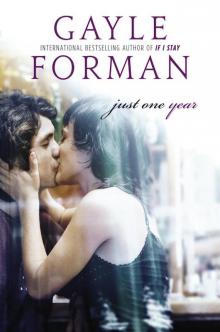 Just One Year
Just One Year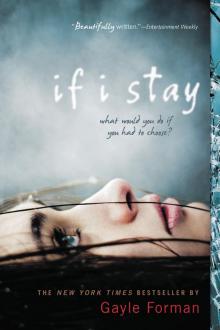 If I Stay
If I Stay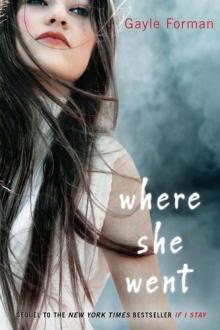 Where She Went
Where She Went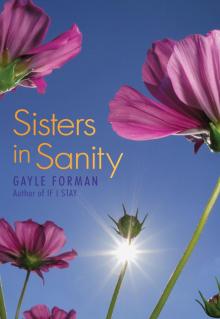 Sisters in Sanity
Sisters in Sanity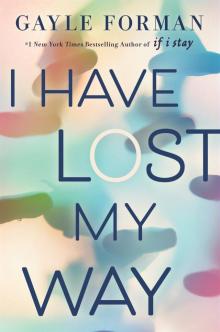 I Have Lost My Way
I Have Lost My Way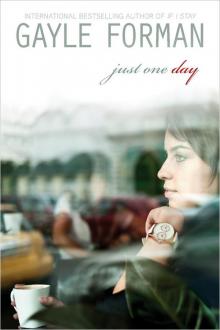 Just One Day
Just One Day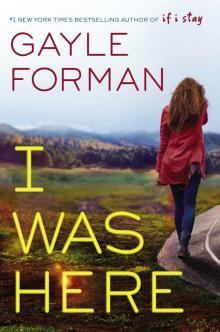 I Was Here
I Was Here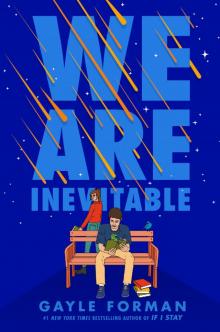 We Are Inevitable
We Are Inevitable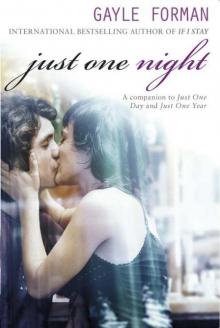 Just One Night
Just One Night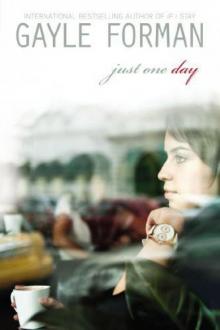 Just One Day jod-1
Just One Day jod-1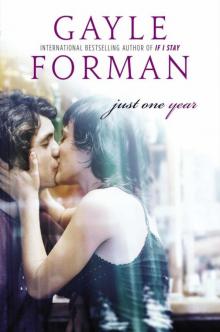 Just One Day 02: Just One Year
Just One Day 02: Just One Year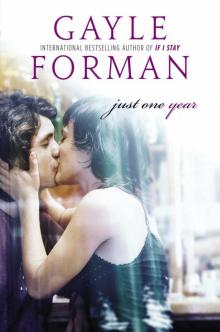 Just One Year jod-2
Just One Year jod-2